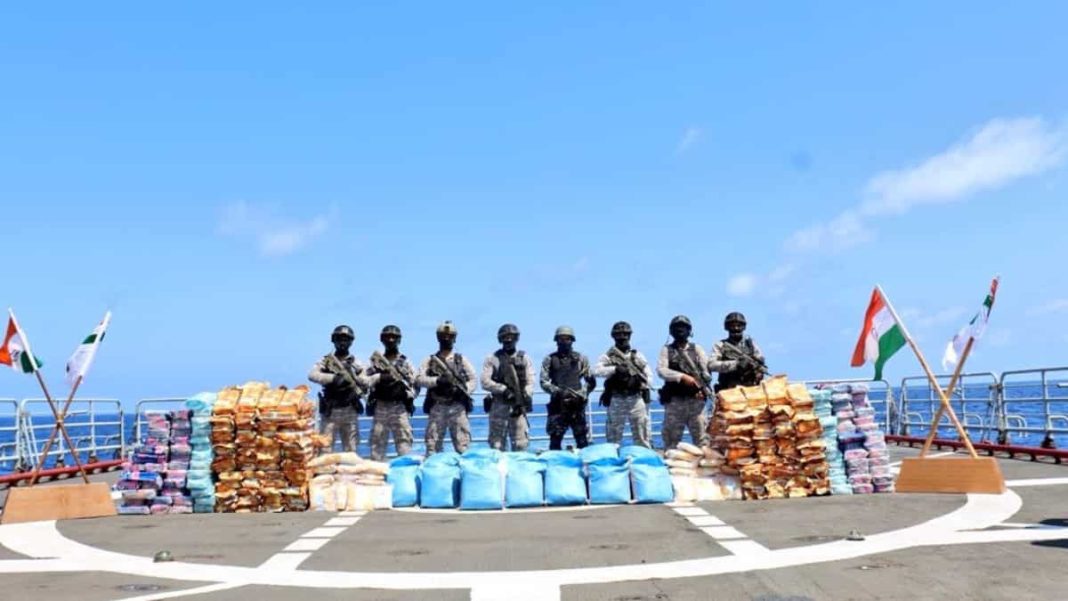As global attention increasingly shifts towards the Indo-Pacific region, India’s elite Marine Commandos, known as MARCOS, have emerged as a crucial force in safeguarding the nation’s maritime interests and enhancing its strategic positioning in a region rife with geopolitical complexities. The Indo-Pacific is not only home to vital maritime trade routes, but it is also witnessing a rise in geopolitical tensions, incidents of piracy, and attacks by groups such as the Houthis.
In 2024, the significance of MARCOS became particularly evident amidst heightened instability in the western Indian Ocean, specifically near Yemen and the Gulf of Aden. The commandos were instrumental in several high-stakes operations, including the successful rescue of the crew from the hijacked vessel MV Lila Norfolk. They also secured the MV Genco Picardy following a drone strike by Houthi militants and conducted daring rescues of Iranian hostages aboard fishing vessel FV Iman from Somali pirates, along with a similar mission to free a Pakistani crew from the fishing vessel AL Naeemi. Another operation to save Lorenzo Putha from Somali pirates occurred in January of the same year, with additional operations, such as the one carried out in March to rescue crew from MV Ruen, underscoring their operational prowess.
Established in 1987, MARCOS has a storied history, beginning with Operation Pawan to counter the Liberation Tigers of Tamil Eelam (LTTE) in Sri Lanka and including significant missions like Operation Cactus in 1988, which thwarted an attempted coup against the Maldivian president. The unit also played a critical role during the 2008 Mumbai terror attacks, which propelled them into the national spotlight and demonstrated their capabilities in urban counter-terrorism.
The spectrum of MARCOS operations ranges from anti-piracy missions and counter-terror activities to hostage rescues and amphibious warfare. Their strategic presence in areas such as the Andaman and Nicobar Islands acts as a vital deterrent against potential threats, with their competency in securing maritime territories reinforcing India’s resolve to protect its interests in contentious areas such as the South China Sea. Furthermore, they have engaged in numerous joint exercises with foreign forces, including U.S. Navy SEALs and participation in multinational drills like RIMPAC, showcasing their versatility and operational readiness.
MARCOS was modeled after the United States Navy SEALs and the United Kingdom’s Special Boat Service (SBS) and has evolved its operational focus to address various modern threats, including piracy, insurgency, and complex grey-zone conflicts. The selection and training process for MARCOS operators is rigorous, commencing with a seven-day aptitude test where only a small percentage of candidates succeed. Following this, candidates undergo a demanding two-week screening at Goa’s Naval Special Warfare Training and Tactical Centre (NSWTTC), with only a fraction progressing to complete the comprehensive training regimen.
The diverse training regime encompasses skills in underwater demolitions, combat diving, sniping, and combat free-fall, and includes specialized training for high-altitude warfare and securing offshore assets. A significant aspect of their induction is a unique oath-taking ceremony, where new commandos pledge allegiance to their nation with a symbolic cut on their thumb using their commando dagger.
MARCOS is also seen as a pivotal element of India’s naval diplomacy. Their deployments not only showcase India’s capability to project power but also contribute to regional stability, aligning military operations with the nation’s broader foreign policy objectives. As India aspires to build a blue-water navy capable of influencing events across oceans, the commandos’ ability to operate “far and deep” is pivotal for the country’s aspirations in the Indo-Pacific.
The life of a MARCOS operator is fraught with physical and psychological challenges. Even after deployments to counter-insurgency areas or operations in high-altitude environments, these commandos engage in ongoing rigorous training to ensure they remain in peak readiness. The toll of bodily injuries and mental strain is a constant reality, yet the resilience and determination that define these operators propel them forward. Often overlooked, the sacrifices inherent to life as a MARCOS operator underscore their commitment to excellence, encapsulated in their motto, “The Few, The Fearless,” which resonates as a testament to their dedication to safeguarding India’s maritime interests and legacy.





